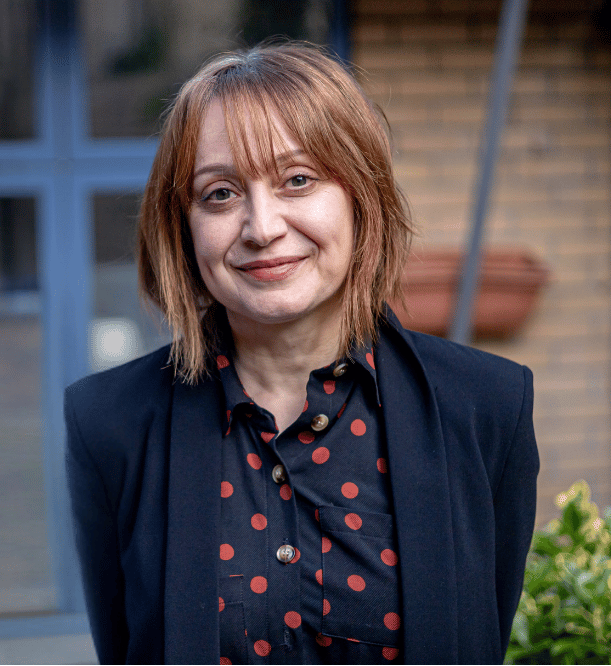Women's Health Issues in Mid-Life
Published on 27 October 2025 12:49 PM

Age UK Islington’s Social Prescriber Olga Andres-Moreno and Islington Carers Hub Caseworker Yvonne Carrera-Curtis share their perspectives
Age UK Islington’s social prescribers are based in 12 of Islington’s GP surgeries, helping Islington residents connect with practical, financial and emotional support to overcome day to day challenges and improve their wellbeing.
Social Prescribers support adults of all ages and inevitably as part of their work they support many women in their late 40s and 50s.
In this article, Olga Andres-Moreno, an Age UK Islington Social Prescribing Link Worker based at the City Road GP Practice, provides her reflections on women’s health and the challenges she frequently sees amongst women in mid life and as they start to get older.
Yvonne Carrera-Curtis, part of Islington Carers Hub, a service provided by Age UK Islington to support Islington residents looking after a partner, relative or friend, also provides her insight into the challenges that caring can present to women in mid-life.
Recognising the Impact of Menopause
Women in their late 40s and 50s experience a variety of challenges in everyday life, but as Olga explains, few recognise that menopause may be a factor contributing to some of the issues.
“They might be experiencing depression, anxiety, or problems at work but not associate it with menopause,” Olga says. “Some describe brain fog, irritability, or constant tiredness. Every woman is different, but sometimes they feel that everything is dark. Tiredness and insomnia are also common, which can make working life even harder. They tend to blame what’s happening around them, not realising how much menopause can affect how they feel.”
Menopause affects all women differently, with most experiencing the transition between ages 45 and 55, though symptoms can begin earlier during perimenopause.
Cultural Attitudes and Awareness
Olga notes that willingness to discuss menopause and women’s health varies greatly between cultures.
“People often shy away from talking openly about menopause, but this differs by background. Coming from Spain, I find that the Spanish are more open about discussing women’s health. In other cultures it can be a complete taboo and some women prefer not to talk to male practitioners or even their husbands about these issues.” She adds that health professionals’ readiness to raise the subject can also vary.
How Social Prescribers Can Help
“Often there’s a package of problems,” Olga explains. “It’s about peeling back the layers. Sharing information about how menopause can affect people differently can subtly shift how women see their situation. Reframing what they’re going through often restores confidence and enables them to approach challenges, such as relationships at work, afresh and in a new light.”
Beyond medical treatment or hormone replacement therapies, practical lifestyle support can make a huge difference.
“For some, socialising, exercise and rest can transform how they feel and sometimes reduce the need for medication. Simply having space to talk can be invaluable. Paying attention to nutrition, joining support groups, or connecting with community services for women’s health can all help.”
Menopause and the Workplace
Awareness is growing in workplaces about how menopause affects employees.
“More organisations now recognise the need for flexible policies and small adjustments,” says Olga. “Not everyone experiences the same symptoms, but having a uniform with removable layers, being located nearer to toilets, or having the option to work flexibly can make a big difference. These are small but meaningful ways to help women manage symptoms and stay comfortable at work.”
Health and Work Beyond Midlife
As women get older, other factors can also affect their ability to work.
“Many people find it harder to sit for long periods,” Olga says. “Standing desks, regular stretches, or short breaks can help. Recovery from muscle strain can take longer, so staying active is important. For those on their feet all day, more frequent shorter breaks can reduce fatigue.”
Caring Responsibilities
Later life often brings new caring responsibilities. According to Carers UK, 59% of unpaid carers are women. Balancing work, health, and caring can be overwhelming.
Yvonne Carrera-Curtis from the Islington Carers Hub, run by Age UK Islington, adds:
“The stress can be off the scale. Many carers feel they can’t keep up with everything. When they come to us, it’s often the first time they’ve really been heard. Having someone to talk to and guide them through their options can help them see that there is potentially light at the end of the tunnel.”
Finding the Positive
Menopause can present real challenges, but experiences differ widely. Some women find it to be a period of positive change, offering liberation from the monthly menstrual cycle and its accompanying discomforts. They might experience a surge of energy and vitality post-menopause free from the hormonal fluctuations of earlier years.
Resources shared in Let's Talk
If you weren't able to attend the October Let's Talk, you might be interested in seeing the slides and resources shared by Val Almeida from Healthy Generations - raising awareness of symptoms of menopause and what can help.
Next Steps
If you’d like to learn more about menopause or access local support, Age UK Islington can help connect you to information, women’s groups, and community activities designed to support wellbeing at every stage of life.
Call the Age UK Islington helpline on 020 7281 6018 (Monday to Friday, 9am o- 5pm) to speak to our team or email: gethelp@ageukislington.org.uk.
Information Resources: Menopause
Information Resources: Sport and Physical Activities
Menstrual Cycle Support Groups
Women’s Support Groups
Maya Centre – Women’s Hub The Maya Centre offers culturally sensitive, low cost counselling and talking therapies for women.
